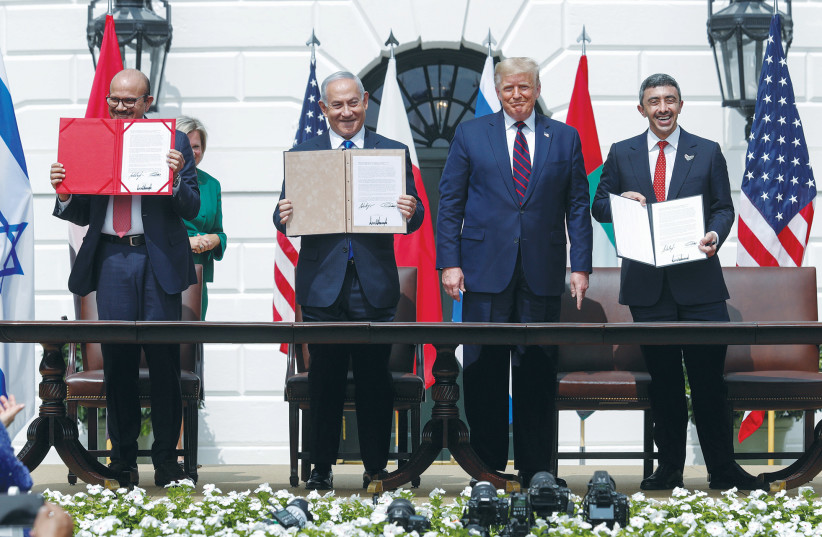There is a meme that has made its way around Twitter countless times. The meme is a picture of a man holding hands with someone who is clearly his significant other but he is distracted by someone more interesting at that moment. The meme is funny because it is true. Who among us hasn’t been in a situation where our focus has been diverted from the enduring to the ephemeral?
This is the meme that I think about whenever I speak about the Abraham Accords, which is rather often. After every speech, someone raises their hand or shouts out, “what about Saudi Arabia?” The Abraham Accords have just passed their second anniversary, yet they are still in their infancy. I for one still get chills when I walk down the terminal in Ben-Gurion Airport and there are as many flights going to the UAE, Morocco and Bahrain as there are to Europe and Asia.
Indeed, I’m old enough to remember when the very concept of warming relations in the region was considered an impossibility. This change for Israel and the region must not be taken for granted.
A lot has happened in the region since the phone call that launched the Abraham Accords. Israel is about to have its fourth prime minister and third Knesset. The United States is about to have its third Congress and is in the midst of its second administration. While Benjamin Netanyahu was Israel’s prime minister when the accords were created and played a critical role in their creation and advancement, the government he is about to lead looks different than the one he led during the origination of the Abraham Accords.
There is a meaningful, although I believe unfounded, concern that this government will not nurture the current accords. The single greatest lever to encourage other countries to join the Abraham Accords, and yes that includes the Kingdom of Saudi Arabia, is to show that the current Abraham Accord countries are a unique priority for Israel.

It is important to remember that in the process of the Abraham Accords the UAE, Morocco, Bahrain, Kosovo and Sudan all started exactly one new relationship, it was an incredibly consequential relationship, but it was only one, it was the relationship with Israel. Israel, on the other hand, has begun five new, complicated and important relations. Netanyahu, when he forms his new government, will have an incredible opportunity to send a message to the Abraham Accord countries by setting up a dedicated ministry or dedicated special envoy to manage and enhance the Abraham Accord relationships.
The Middle East changed forever on August 13, 2020, when then-president Donald Trump hosted the phone call between then-Crown Prince Mohammed Bin Zayed and then-prime minister Netanyahu. Yet two years later, the Accords have barely begun to touch their enormous potential. The change that the Abraham Accords will bring to the Middle East will determine in a large part how the next two years of the Abraham Accords progress. This is simply too meaningful of an opportunity for it to get lost in the bureaucracy of another new Israeli government.
Netanyahu has already done so much to leave his imprint on Israel; this would be his government’s opportunity to further enhance that impact on the entire region by showing the countries in the Abraham Accords that they are a priority and there will be a dedicated ministry in his new government to enhance them. If that happens, the meme will be relevant once again but this time, it will be the other non-accord countries holding hands with the past as they look over their shoulder longingly at the future, at the Abraham Accords.
The writer was the senior adviser to former US ambassador to Israel David Friedman and special envoy for economic normalization for the Abraham Accords.
